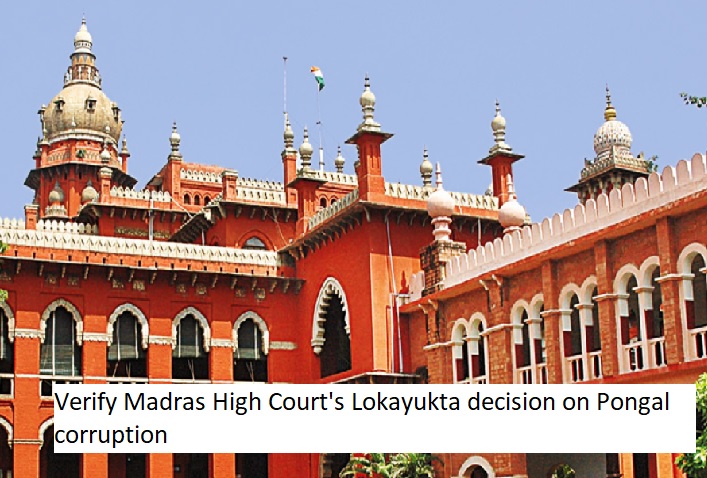


The Madras High Court recently delivered a significant judgment, overturning the decision of the Tamil Nadu Lokayukta to reject a complaint related to alleged corruption in the procurement of Pongal gift hampers in the year 2022. The court's ruling is rooted in a meticulous examination of the provisions of the Lokayukta Act and underscores the importance of the Lokayukta's role in addressing corruption.
The case originated from a complaint filed by petitioner KR Jayagopi, who approached the Lokayukta with allegations of corruption, acts of malfeasance, and impropriety against certain respondents involved in the procurement of gift hampers for distribution to underprivileged citizens during Pongal 2022. The petitioner contended that the procurement process violated the Tamil Nadu Transparency in Tenders Act, 1998, and its accompanying rules. Furthermore, Jayagopi asserted that the articles procured were of sub-standard quality and obtained at an exorbitant price.
However, the Lokayukta rejected the complaint, citing Section 13(1)(c) of the Tamil Nadu Lokayukta Act 2018, along with Rules 24(4)(a) to (d). Section 13(1)(c) specifically addresses situations where the Lokayukta cannot hold an inquiry, focusing on administrative actions arising from the terms of a contract governing purely commercial relations of the administration with customers or suppliers. The Lokayukta, in this instance, deemed the complaint ineligible for consideration based on this provision.
Justice N Seshasayee, presiding over the case, critically examined the Lokayukta's decision and observed that the exception outlined in Section 13(1)(c) applied only when the issue fell within the contractual framework. The court emphasized that the complaint at hand alleged corruption in the procurement process, a matter falling squarely within the Lokayukta's purview.
The court's interpretation rested on a nuanced understanding of Section 13(1)(c), stressing that it exempts issues within a contract or its terms but does not extend to accusations such as corruption in procurement, as raised by the petitioner. The court underscored that the Lokayukta's mandate encompasses probing corruption, and in this case, the complaint pertained to the alleged corrupt practices in procuring the gift hampers.
Crucially, the court highlighted that all the respondents implicated in the complaint were either government ministers or officials, individuals subject to proceedings under the Prevention of Corruption Act. This satisfied the first criterion for the Lokayukta to act. Additionally, since corruption was alleged, the court found that the Lokayukta met the second criterion necessary for initiating an inquiry.
The court, in its analysis, emphasized the Lokayukta's authority to investigate complaints alleging corruption, abetment of corruption, conspiracy to engage in corruption, and improper exercise of discretion in administrative decisions. It clarified that the Lokayukta could also examine complaints involving individuals subject to proceedings under the Prevention of Corruption Act.
Moreover, the court underscored the potential consequences of the Lokayukta failing to order an inquiry when allegations did not fall within the exceptions outlined in Section 13. It asserted that such a failure would undermine the purpose behind establishing the statutory watchdog. To avoid this, the court insisted on the necessity of the Lokayukta resorting to the course of ordering an inquiry under Section 19, lest the objective behind constituting a Lokayukta be jeopardized.
In conclusion, the Madras High Court's decision is a robust affirmation of the Lokayukta's jurisdiction in matters of alleged corruption, particularly when involving high-ranking government officials. By setting aside the Lokayukta's order and remanding the matter for reconsideration, the court has reasserted the pivotal role of the Lokayukta in ensuring transparency and accountability in administrative processes.
TAGS: Madras High Court Tamil Nadu Lokayukta Pongal gift hampers Corruption allegations Lokayukta Act